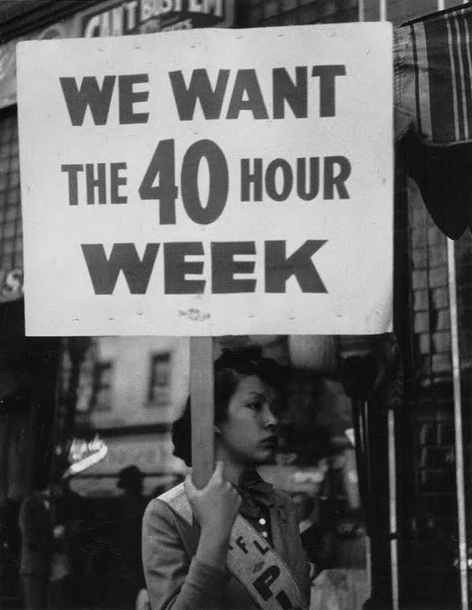Why Did Private Sector Unions Decline?

Larry Mishel, Lane Windham, and Lynn Rhinehart have a new report out of the Economic Policy Institute that explains the decline of private sector unionism. The short answer is that these unions declined because corporations took over the labor law establishment and made punishments for labor law violations completely meaningless. From the Executive Summary.
Among its key findings, the paper shows that in the 1950s and 1960s more than 1% of those employed participated in an NLRA election each year. In the 1970s that share fell to 0.78% and in the 1980s to 0.29%. In addition, workers began to lose elections at a higher rate in the 1970s in the face of increased employer resistance. In the 1940s, workers won a union in 80 percent of NLRB representation elections, but by 1977 workers were losing more than half of these elections. And, while 86% of workers who chose a union were able to win a first contract in the 1950s, that share declined to less than 70% in the 1970s. By the 1990s, it was down to 56%. Putting these three pieces together—participation in elections, successful elections, and winning a first contract—we show that while 0.46% of the workforce was able to make it across the unionizing finish line in the 1966–1968 period, only 0.17% of the workforce was able to do so by 1978–1980.
In addition, by the 1970s employers were charged with committing significantly more unfair labor practices (ULPs), such as firing union activists during organizing campaigns. ULP charges against employers rose sevenfold between 1950 and 1980. Starting in the 1970s, employers also made greater use of the “free speech” rights included in the Taft-Hartley amendments of 1947, holding mandatory “captive audience” meetings to voice opposition to unions and make thinly veiled threats about what could happen if workers organized. Employers also began far more extensive use of a growing “union avoidance” industry of consultants. While there were just a handful of anti-union consulting firms in the beginning of the 1970s, by decade’s end there were hundreds, and a management consultant told Congress in the late 1970s that his industry had grown tenfold over the preceding decade.
Employers were able to defeat unions so effectively because, over the years, labor law had become heavily tilted against workers and toward employers. Though these employer-friendly laws were on the books in the 1940s, 1950s, and 1960s, it was not until the 1970s that employers began to take full advantage of their power. Several key sources set the stage for this 1970s unraveling of workers’ bargaining power under the law. First, a Republican Congress largely neutered workers’ leverage in passing the 1947 Taft-Hartley Act over President Truman’s veto. Second, Taft-Hartley forced the NLRB to prioritize litigation against unions for engaging in so-called secondary activity over all other cases, including cases involving illegal firings of union supporters. Third, the law’s ineffective remedies became obvious, and the NLRB’s efforts to hold employers accountable for violating the law were stymied in the courts. Fourth, employers increasingly found an ally in the U.S. Supreme Court, which issued a series of decisions restricting workers’ rights and limiting employers’ bargaining obligations. Finally, employers started making greater use of replacement workers during strikes—a trend that grew in the 1970s and 1980s and significantly undermined workers’ right to strike. The cumulative impact of these factors meant that by the 1970s the law did not effectively protect workers’ bargaining power and gave employers a wealth of tools to resist unionization.
Legislative efforts to strengthen the law in the 1960s, 1970s, and 1990s were thwarted by an organized and united business community that stepped up to vigorously oppose and, through a filibuster by a minority of senators, defeat all attempts at legislative reform.
None of this is particularly surprising. But it both pushes back against other myths (corruption, people didn’t think they needed unions anymore, etc) while stressing the absolutely centrality of labor law as the most important issue. The latter doesn’t receive nearly enough attention, including on the labor left, which would prefer to talk about how unions don’t have enough democracy, leadership selling out the rank-and-file, or the bankruptcy of politics than to get at the core of the real problems we face. We haven’t had comprehensive labor legislation in this nation in 82 years and it shows.
Mishel has a great Twitter thread that you can follow for the major points.
(2/14)Bottom line, weaknesses in labor law (such as basically no penalties), exploited by employers (legally and illegally) that crushed ability to obtain a union, starting over 1970s,in 1980s & to this day! It wasn’t lack of worker interest or simply automation/globalization
— Larry Mishel (@LarryMishel) December 10, 2020


